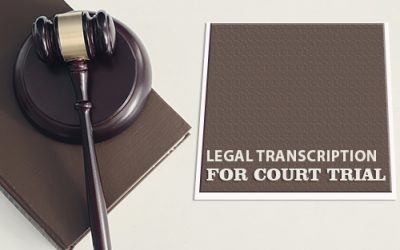According to a recent WSIL news report, court reporters are in high demand across the U.S. Court reporters keep records of court proceedings. The key players in a case typically include the judge, attorneys, the plaintiff, the defendant, the bailiff, witnesses, court interpreters, and jurors. Court reporters keep track of what’s said in court and produce transcripts of everything said in a case. Many court reporters rely on digital transcription agencies to ensure accurate and timely audio/video-to-text solutions for legal teams and their clients. As they produce document court proceedings and depositions, court reporters need to comply with codes of ethics to maintain the integrity of the record. Let’s take a look at what professional ethics means for court reporters.
- Maintain impartiality: Remaining impartial and neutral is one of the most important things for a court reporter. This means that their actions must be in conformance with the NCRA’s Code of Professional Ethics (COPE). The manner in which they report courtroom proceedings can impact the outcome of the case. For instance, if the attorney asks the court reporter for their opinion of the witness, the court reporter must remain neutral by not expressing personal opinions about any aspect of a case. Court reporters should provide same level of service to all parties involved – the lawyers, witnesses and others. The NCRA’s code states: “Be fair and impartial toward each participant in all aspects of reported proceedings, and always offer to provide comparable services to all parties in a proceeding”.
- Avoid conflicts of interest: Court reporter need to be vigilant about avoiding a conflict or a potential conflict of interest. Examples of conflict of interest include a direct interest with the outcome of the case or having a personal connection with a litigant or witness. If aware of a conflict or potential conflict, the court reporter has a duty to report or disclose it. The NCRA states: “Be alert to situations that are conflicts of interest or that may give the appearance of a conflict of interest. If a conflict or a potential conflict arises, the Member shall disclose that conflict or potential conflict.”
- Preserve confidentiality of information: As in the medical profession, confidentiality is an important aspect in the legal profession. The court reporter should refrain from disclosing what happened in the courtroom or deposition room to anyone. This also includes safeguarding the deposition transcript and exhibits, both hard copy and online. That’s why it’s critical to outsource deposition transcription to a reliable legal transcription company. Transcripts should not be disclosed or sold unless the record is made public. If several parties request a transcript or other deposition material, the court reporter should provide the information to all parties at the same time. According to NCRA guidelines, court reporters must “preserve the confidentiality and ensure the security of information, oral or written, entrusted to the Member by any of the parties in a proceeding.”
- Respect off-the-record statements: Court reporters should not put comments in the official transcript that were announced as off the record. When either party wants to be on the record, a court reporter must record the proceedings. JD Supra explains this rule as follows: “If something is said after the deposition’s conclusion, it can’t be added to the record, even if the attorney asks the court reporter to include it. To bring off-the-record comments into consideration in court, an attorney would be required to subpoena the reporter to testify about anything they may have heard”.
- Don’t accept incentives: Incentive gifting implies giving a direct reward for scheduling a future deposition. Hiring a court reporter should be based on qualifications and professionalism and not gifting. Incentive gifting is strictly prohibited by the NCRA. If court reporters or their firms accept a gift or perk for their services, it can amount to favoritism and impropriety. The NCRA’s code of ethics states: “Refrain from giving, directly or indirectly, any gift or anything of value to attorneys or their staff, other clients or their staff, or any other persons or entities associated with any litigation, which exceeds $150 in the aggregate per recipient each year. Nothing offered in exchange for future work is permissible, regardless of its value. Pro bono services as defined by the NCRA Guidelines for Professional Practice or by applicable state and local laws, rules and regulations are permissible in any amount.”
Professional court reporters will abide by all of these rules, and make the deposition process easier and less stressful for attorneys and their clients. Experienced audio transcription service providers can help court reporters ensure the accuracy and integrity of their records.




